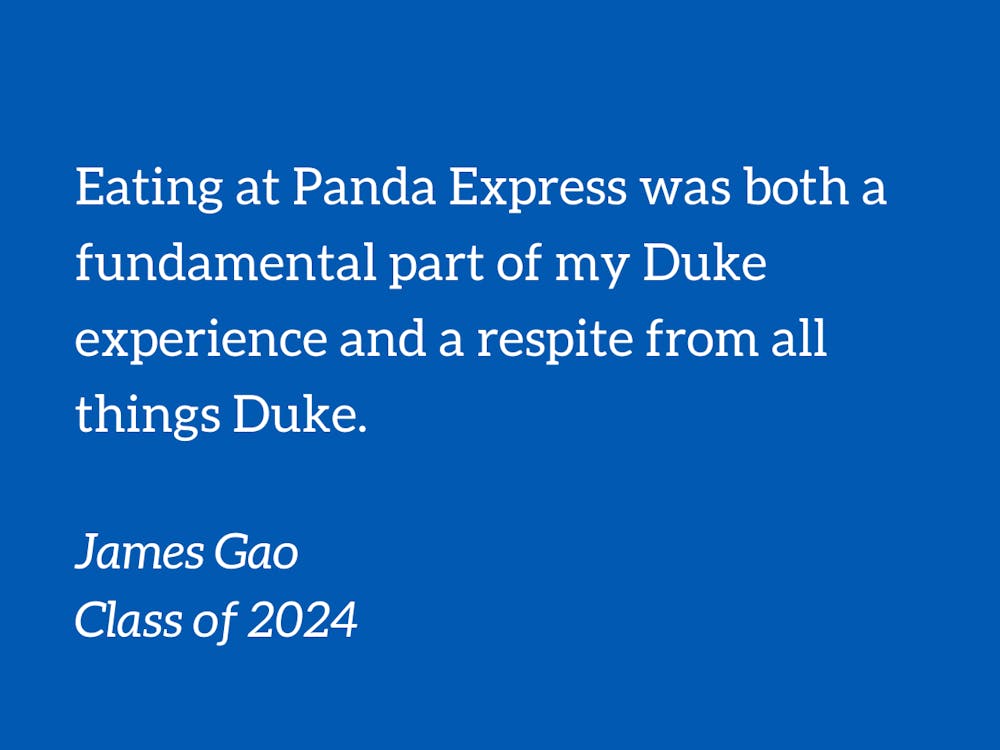Panda Express’s dining contract with Duke was not renewed after it expired last year, leading the way for It’s Thyme to take over its previous premises. In an official statement, Executive Director of Dining Robert Coffey cited the need for more allergen and gluten-free dining options on West Campus, which It’s Thyme will help fulfill. Duke is just one of many universities making ambitious changes to its meal plans to accommodate dietary restrictions. This is a good thing — inclusivity matters, especially when meal plans are mandatory for all students living on campus. This is not a diatribe against the direction that Duke Dining is headed. It is merely a eulogy for the places, foods and memories that it has left behind.
On its face, Panda Express is just another restaurant chain, and its decision to shutter one location out of more than 2,300 may not even register as a blip on the radar in the grand universe of fast food chains. But for me, and many other Duke students, Panda Express was more than an ordinary meal — it was comfort food and cultural food. Eating at Panda Express was both a fundamental part of my Duke experience and a respite from all things Duke.
As a child of Chinese immigrants, I did not go to Panda Express very often growing up. The chain’s reputation for inauthenticity preceded it among Asian-Americans. In elementary school, Panda Express was a playground punchline — perhaps because our parents had shown us the diversity of “true” Chinese cuisine, or perhaps because we wanted to reinforce to our white peers that we were more than the Western stereotypes of people who looked like us.
My freshman year of university was my first time living away from my parents. I enjoyed Marketplace and WU, but I frequently found myself craving steamed rice and stir-fried vegetables, two staples of my diet at home. Once a week, I would order Panda and call my parents. It wasn’t the same as eating with them at our dining room table, but it was as close as I could get. In Chinese culture, there is a tradition that on a loved one’s birthday, you should eat noodles; the longer the noodles, the longer the celebrant will live. On my brother’s birthday that year, I remember surveying my on-campus options and realizing that my best option was a bowl of Panda Express lo mein. Panda was my strongest connection to the smells and sounds of my childhood. Sure, it was imperfect. Sure, none of it was “really Chinese.” But with my broken Chinese and American education, who was I to decide what “authenticity” meant?
It’s Thyme arrives on campus both free of allergens and free of personality. It’s unclear what cuisine, if any, it belongs to. Some have remarked to me that it feels like Sazon’s bastard child. West Campus’s third “build-your-own-bowl” option has less of a niche than either of its predecessors. I worry that Duke’s pursuit of healthy but inclusive food service has made its meal options more indistinct and less memorable. In that regard, Panda Express was unapologetically different. It paid only lip service to health-consciousness, its portions were generous and even as other restaurant costs skyrocketed after COVID, Panda Express stayed cheap. Gone are the days when a $9.80 plate could provide both lunch and dinner. Inexplicably, Panda’s departure feels like gentrification.
So this is thank you and goodbye to a campus restaurant that was more than a restaurant. I will miss Panda meals. I will miss the era of Duke it represented. And I will miss the connection, however temporary, it provided me to my family: a bridge to my heritage, built of lo mein and teriyaki chicken.
James Gao is a Trinity Senior. His column typically runs on alternate Fridays.
Get The Chronicle straight to your inbox
Signup for our weekly newsletter. Cancel at any time.

